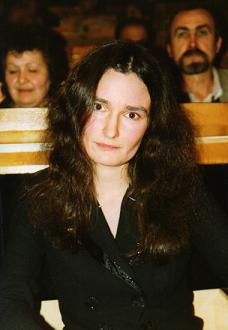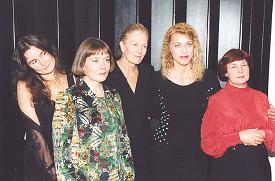|
Vera Pavlova was born on 4 May, 1963, in Moscow. She finished High Studies of Music in the Shnitke Academy of Music, specializing in the field "History of Music". When she was 18 years old, on the blessings of Aram Khachaturian, she was preparing herself to be a composer. She worked as guide in Shalyapin's Museum, published a musicological essay, and for about 10 years sang in the church Polecat.
She began to write verses at the age of 20 years. She published her first verses then when she was 24, being pregnant with her second daughter. The first selection was published in the journal "Youth" - "Юность", the first critics arrived after the appearance in the newspaper "Today" - "Сегодня" of a lot of 72 poems (with Boris Kuzminskiy's epilogue), which gave birth to myth that Vera Pavlova could be a literary forgery.
Her verses were published in many newspapers and periodicals. The first book - "Celestial Animal" – "Небесное животное" went out in 1997 in the publishing house "Gold of Vek" - "Золотой векъ". After it, two books were published in the St. Petersburg publishing house "Puskinskaya Fund": the "Second Language" (1998) - "Второй язык" and the "Line of Detachment" (2000) - "Линия отрыва". The book "Fourth Sleep" - "Четвертый сон" ("Zakharov", 2000) obtained the Prize Apollo Grigoryev.
Vera Pavlova directed for 8 years the children's literary studio named "Zodiac" - "Зодиак".
|
 |
